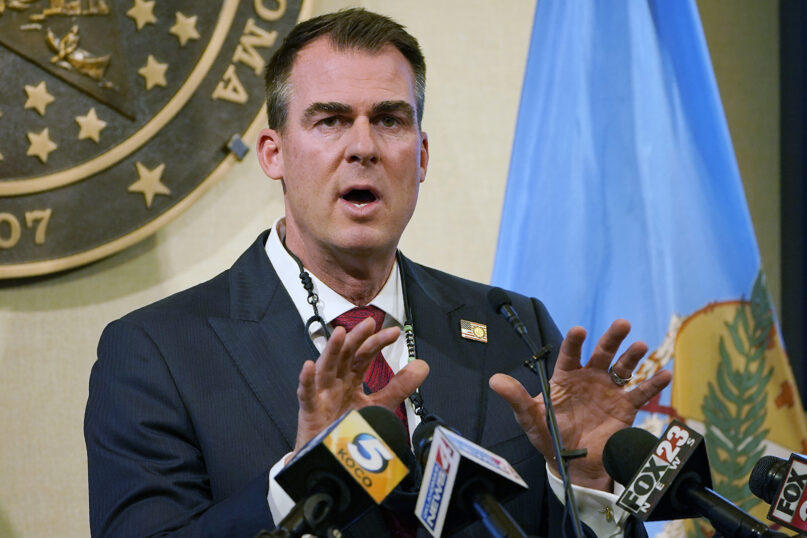(RNS) — By the decree of Gov. Kevin Stitt, Oklahoma is observing Thursday (Dec. 3) as a day of prayer and fasting, asking God “to heal those who are sick, comfort those who are hurting and provide renewed strength and wisdom to all who are managing the effects of COVID-19.”
Even though I believe in the sacredness of the Constitution’s wall between church and state, I applaud the governor’s state-sponsored establishment of a religious day, and all those who would join him in prayer and fasting, even, or especially, if they don’t believe in God.
No, that’s not hypocritical. It speaks to both the potential power of Stitt’s idea and the genius of our Constitution, which precludes the marriage of church and state, but not the presence of faith in public life.
Given that the overwhelming majority of Oklahoma’s citizens are believers, and that nothing in the governor’s proclamation either compels any behaviors or celebrates any particular tradition, it seems like a wonderful way to mobilize collective action around two practices that have nurtured people’s ability to find strength, comfort, compassion and wisdom, especially in challenging times.
RELATED: How a Supreme Court bent on protecting religion could harm it
Turning to prayer during the pandemic isn’t the equivalent of atheists praying in foxholes — some proof that “deep down, all people believe in God,” even if some religious folks would like to believe that. It speaks to the fact that none of us wants to feel alone when we are vulnerable.
That’s why I think that one can participate meaningfully and usefully in prayer, without necessarily believing in God. Whether Stitt believes that or not is actually irrelevant to me, and why this proclamation is worthy of applause. Prayer is the authentic expression of our most deeply felt thoughts and emotions, whose power can often be found in their “mere” expression, regardless of tradition or theology.
Stitt’s lack of advocacy for science-based policies in the face of the pandemic and his history of questioning the use of childhood vaccines may make his decree a bitter pill to swallow for some. But bitter pills must be swallowed and vaccines taken — when they offer proven healing — even if doing so is not pleasant.
We believe that asserting personal freedom is not an excuse for denying good science, or worse, putting our neighbors at risk by having done so. But we also believe a statewide day of prayer and fasting can do so much good, at the cultural level if not the medical level. It’s self-defeating to fight the message just because we don’t support the messenger.
Do I wish the decree had been worded differently? I do. It’s not true, as Stitt’s declaration says, that “Oklahomans have always (bold italic is mine) turned to prayer to guide us through trials and seasons of uncertainty.” Worse, it might be read as suggesting that if one has not turned to prayer, one may be less than fully Oklahoman.
The official proclamation also includes a reference to the biblical Book of Second Chronicles. “If my people, who are called by my name, will humble themselves and pray and seek my face and turn from their wicked ways, then I will hear from heaven, and I will forgive their sin and will heal their land.”
One could interpret this as saying that we are sick and dying because we have sinned. Even if Stitt believes that, that belief has no place in government or government policymaking.
But it would be ungenerous to ignore the governor’s call because of these flaws. We can decide to assume the worst, or decide the best about each other. We can give each other the benefit of the doubt or not. In times of crisis, I know how tempting one is, and how productive the other is. You decide which is which.
So despite its potential challenges and pitfalls, I applaud Oklahoma’s day of prayer and fasting. I look forward to seeing how a day of getting above the fray and going deeper can help folks find the capacities and capabilities they need to care for themselves and for others.
I embrace it because I know that regardless of politics, party or policy, we all need to move forward. I embrace it because hopefully, by turning to God, or whatever we call that which is bigger than ourselves, we can find the comfort, strength and wisdom we all need so badly these days.
(Rabbi Brad Hirschfield is president of the National Jewish Center for Learning and Leadership. The views expressed in this commentary do not necessarily represent those of Religion News Service.)





